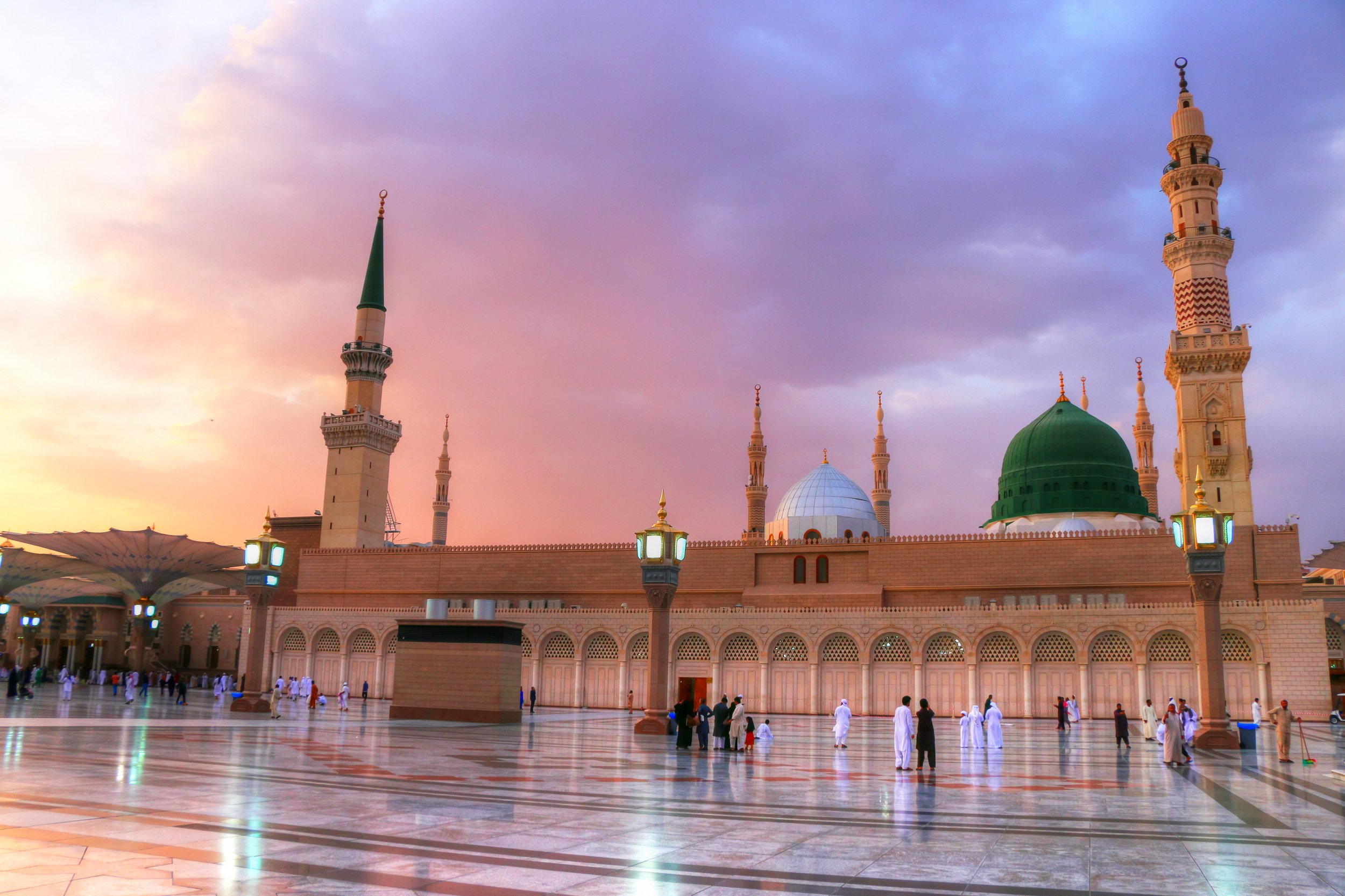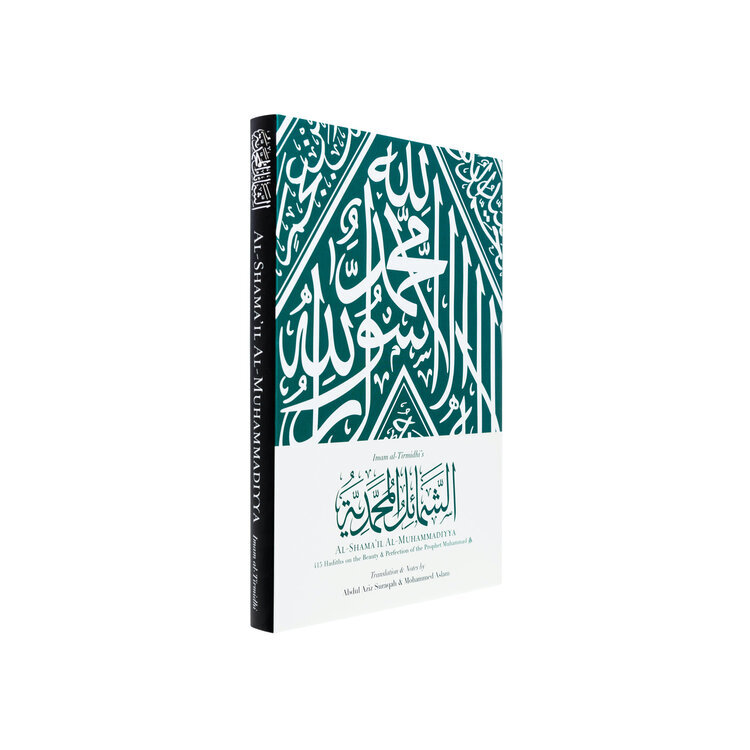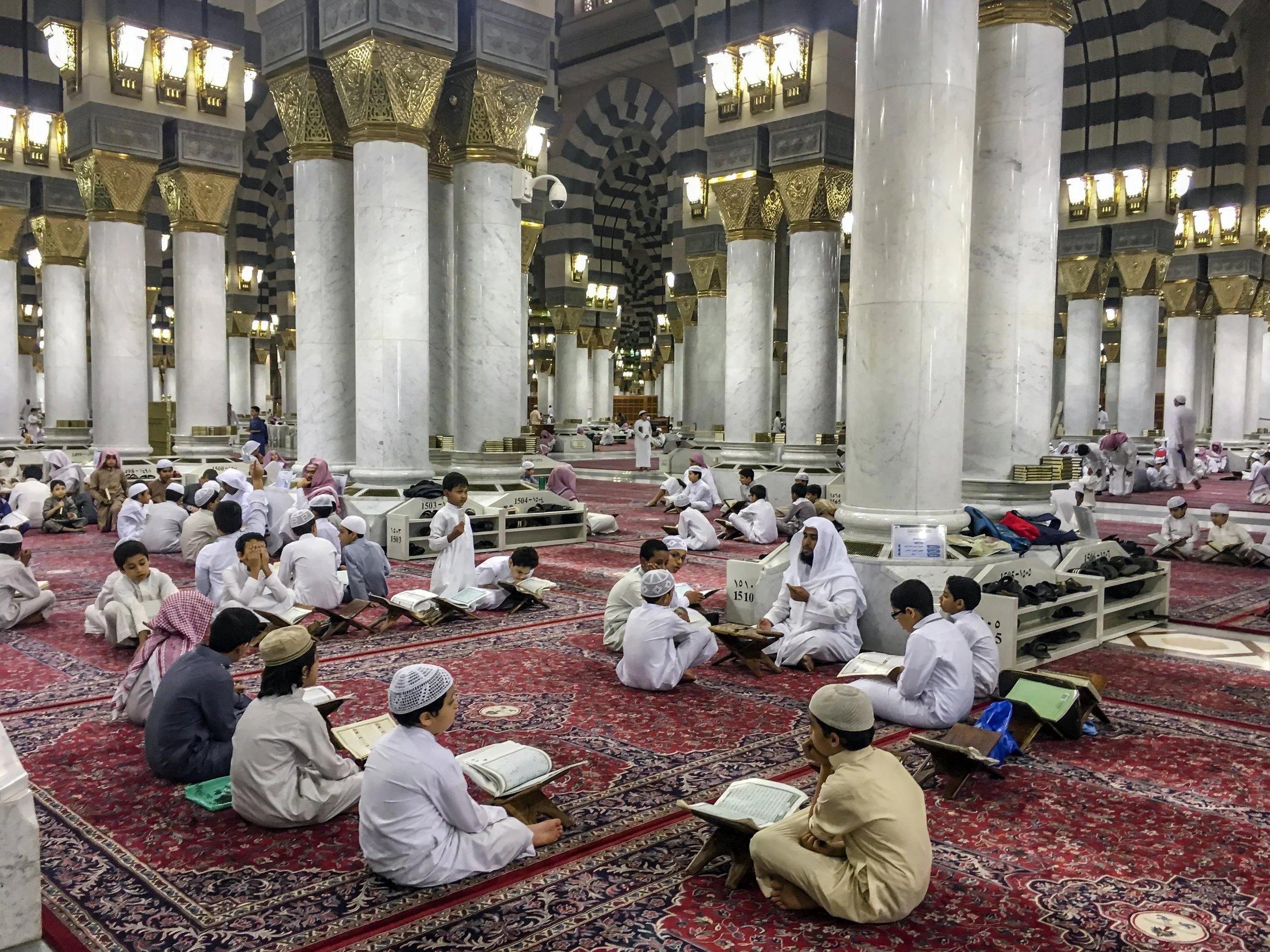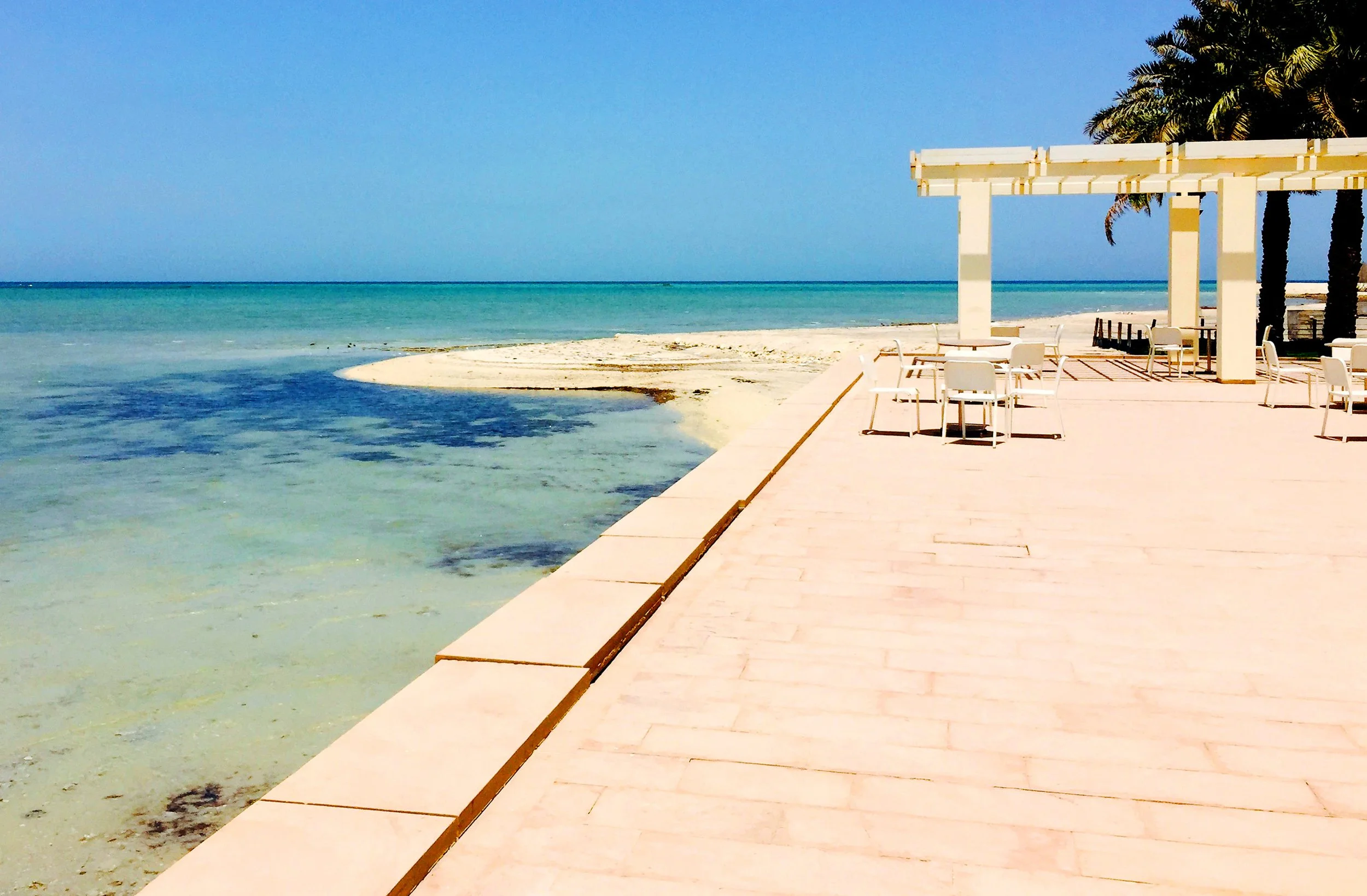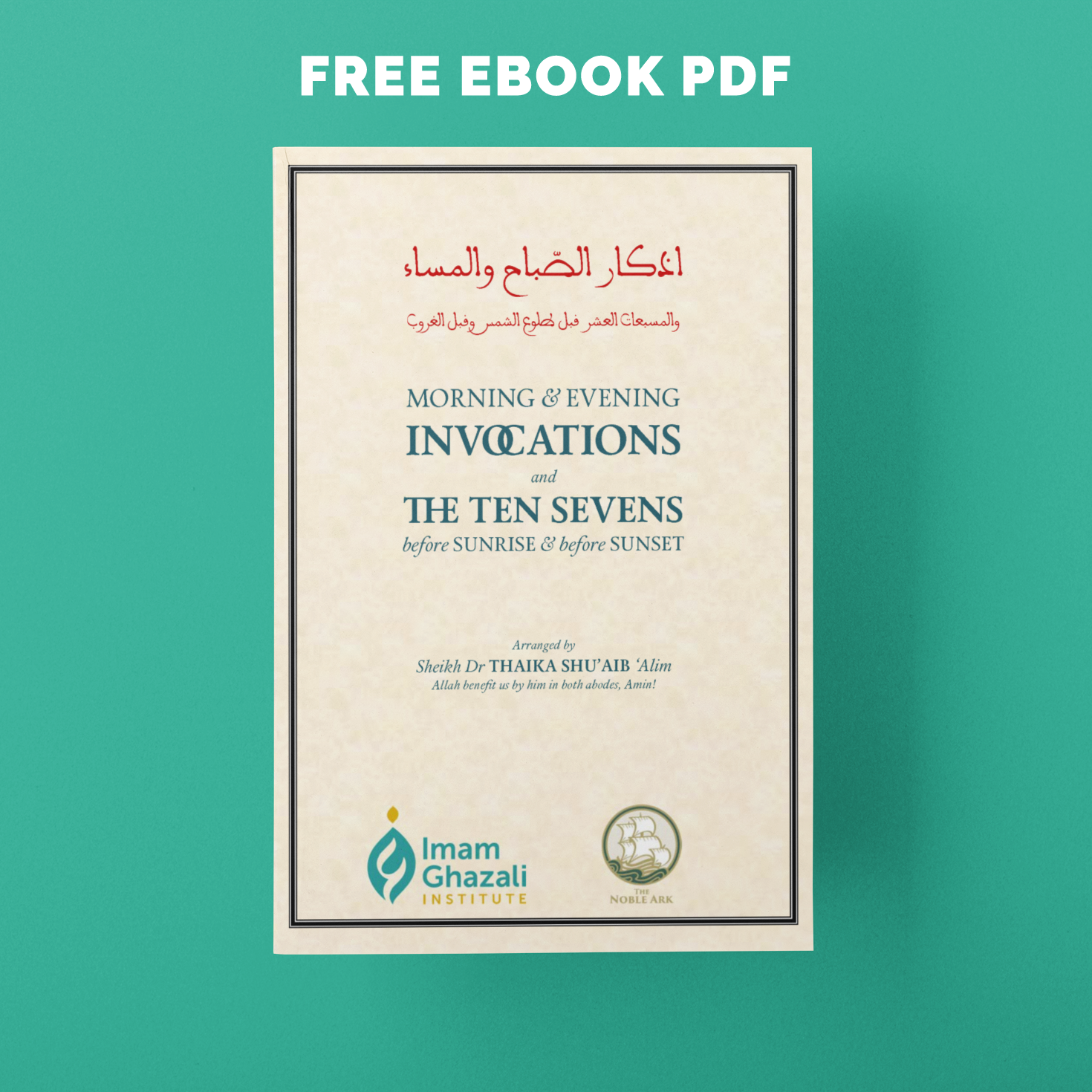This article is excerpted from Morning and Evening Invocations, a collection of du’a and adhkar from the Qur’an, Sunnah, and righteous scholars published by IGI in 2021. Available in paperback and as a free PDF.
ABU HURAIRA ad-Dawsi al-Yamani رضي الله عنه was noble sahabi and a prolific narrator of ahadith, in spite of the short period of time of his contact with the Prophet ﷺ.
He is revered by the folk of tasawwuf as one of the ahl as-suffa.
His acceptance of Islam رضي الله عنه
Abu Huraira رضي الله عنه became a Muslim at the hands of at-Tufail b. ‘Amr رضي الله عنه, the chieftain of the Daws tribe to which he belonged. The Daws lived in the region of Tihama which stretches along the coast of the Red Sea in southern Arabia.
When at-Tufail رضي الله عنه returned to his village after meeting with the Prophet ﷺ and becoming a Muslim in the early years of his mission, he was one of the first to respond to his call, unlike the majority of the Daws who remained stubborn in their old beliefs for a long time.
Abu Huraira رضي الله عنه was born into the tribe of Daws, who lived in the region of Tihama along the coast of the Red Sea in southern Arabia.
When at-Tufail رضي الله عنه visited Mecca again, Abu Huraira رضي الله عنه accompanied him. There he had the honour and privilege of meeting the Noble Prophet ﷺ who asked him:
“What is your name?”
He رضي الله عنه replied: “‘Abd ash-Shams (Servant of a Sun).”
The Prophet ﷺ said: “Let it be ‘Abd ar-Rahman (Servant of the Beneficent Lord).”
He رضي الله عنه said: “Yes, ‘Abd ar-Rahman (it shall be), O Messenger of Allah.”
His kunya continued to be Abu Huraira, literally “father of a kitten”, as he was fond of cats (just like the Prophet ﷺ) and often had a cat with him since his childhood.
Abu Huraira رضي الله عنه stayed in Tihama for several years and it was only at the beginning of the seventh year of the hijra that he arrived in Medina with others of his tribe. The Prophet ﷺ had gone on a campaign to Khaibar. Being destitute, he took up his place in the Masjid with others of the ahl as-suffa.
Abu Huraira is well-known as one of the ahl as-suffa, the companions who lived near the entrance to Masjid al-Nabawi and the house of the Prophet ﷺ.
The guidance of his mother رضي الله عنها
He was single, without wife or child. With him however was his mother who was still an unbeliever. He longed and prayed for her to become a Muslim but she adamantly refused.
One day, he invited her to have faith in Allah alone and follow His Prophet ﷺ but she uttered some words about the Prophet ﷺ which saddened him greatly.
With tears in his eyes, he went to the Noble Prophet ﷺ who asked:
‘What makes you cry, O Abu Huraira?’
‘He replied: “I have not let up in inviting my mother to Islam but she has always rebuffed me. Today, I invited her again and I heard words from her which I do not like. Do make supplication to Allah to make the heart of Abu Huraira’s mother incline to Islam.”’
The Prophet ﷺ responded to his request and prayed for his mother. He then said:
‘I went home and found the door closed. I heard the splashing of water and when I tried to enter, my mother said: “Stay where you are, O Abu Huraira.” And after putting on her clothes, she said, “Enter!”
‘I entered and she رضي الله عنها said: “I testify that there is no god but Allah and I testify that Muhammad is His Servant and His Messenger.”
‘I returned to the Prophet ﷺ weeping with joy just as an hour before I had gone weeping from sadness and said: “I have good news, O Messenger of Allah ﷺ. Allah has responded to your prayer and guided the mother of Abu Huraira رضي الله عنها to Islam.”’
A number of the reports included in The Forty Hadith of Imam al-Nawawi are narrated from Abu Huraira رضي الله عنه.
He loved the Prophet ﷺ immensely and found favour with him. He was never tired of looking at the Prophet ﷺ whose face appeared to him as having all the radiance of the sun and he was never tired of listening to him.
Often he would praise Allah for his good fortune and say:
‘Praise be to Allah Who has guided Abu Huraira to Islam. Praise be to Allah Who has taught Abu Huraira the Qur’an. Praise be to Allah Who has bestowed on Abu Huraira the companionship of Muhammad ﷺ.’
On reaching Medina, he set his heart on attaining knowledge. Zaid b. Thabit رضي الله عنه, the notable companion of the Prophet ﷺ reported:
‘While Abu Huraira and I and another friend of mine were in the mosque praying to Allah Almighty and performing dhikr to Him, the Messenger of Allah ﷺ appeared. He came towards us and sat among us. We became silent and he said: “Carry on with what you were doing.”
‘So my friend and I made a supplication to Allah before Abu Huraira رضي الله عنه did and the Prophet ﷺ began to say “Amin” to our du’a.
‘Then Abu Huraira رضي الله عنه made a supplication saying: “O Lord, I ask You for what my two companions have asked and I ask You for knowledge which will not be forgotten.”
‘The Prophet ﷺ said: “Amin”.
‘We then said: “And we ask Allah for knowledge which will not be forgotten”,
‘The Prophet ﷺ replied: “The Dawsi youth has asked for this before you.”’
Unlike many of the muhajirun, Abu Huraira رضي الله عنه did not busy himself in the market places, with buying and selling.
His Extraordinary Memory رضي الله عنه
He رضي الله عنه had free time at his disposal. Unlike many of the muhajirun he did not busy himself in the market places, with buying and selling. Unlike many of the ansar, he had no land to cultivate nor crops to tend. He رضي الله عنه stayed with the Prophet ﷺ in Medina and went with him on journeys and expeditions.
With his formidable memory, he رضي الله عنه set out to memorise in the four years that he spent with the Prophet ﷺ the gems of wisdom that emanated from his lips. He realized that he had a great gift and he set about to use it to the full in the service of Islam. Many companions were amazed at the number of hadith he had memorized and often questioned him on when he had heard a certain hadith and under what circumstances.
Once Marwan b. al-Hakam wanted to test his رضي الله عنه power of memory. He sat with him in one room and behind a curtain he placed a scribe, unknown to Abu Huraira رضي الله عنه, and ordered him to write down whatever Abu Huraira رضي الله عنه said. A year later, Marwan called Abu Huraira رضي الله عنه again and asked him to recall the same ahadith which the scribe had recorded. It was found that he رضي الله عنه had not forgotten a single word.
Imam al-Tirmidhi’s Al-Shama’il al-Muhammadiyya contains dozens of ahadith transmitted from Sayyiduna Abu Huraira رضي الله عنه.
He رضي الله عنه was concerned to teach and transmit the hadith he had memorized and knowledge of Islam in general. It is reported that one day he passed through the souk of Medina and naturally saw people engrossed in the business of buying and selling.
‘“How feeble are you, O people of Medina!” he رضي الله عنه said.
‘“What do you see that is feeble in us, Abu Huraira?” they asked.
‘“The inheritance of the Messenger of Allah ﷺ is being distributed and you remain here! Won’t you go and take your portion?” he said.
‘“Where is this, O Abu Huraira?” they asked.
‘“In the mosque,” he replied.
‘They left quickly. He waited until they returned. When they saw him, they said: “O Abu Huraira, we went to the mosque and entered and we did not see anything being distributed.”
‘He asked: “Didn’t you see anyone in the Masjid?”
‘They replied: “O yes, we saw some people performing salat, some people reading Qur’an and some people discussing about what is halal and what is haram.”
‘He replied: “Woe unto you, that is the inheritance of Muhammad ﷺ.”’
The people returned from the masjid and said to Abu Huraira رضي الله عنه: “…we saw some people performing salat, some people reading Qur’an and some people discussing about what is halal and what is haram.” He رضي الله عنه replied: “Woe unto you, that is the inheritance of Muhammad ﷺ.”’
His رضي الله عنه hardships in the Way of Allah
He رضي الله عنه underwent much hardship and difficulties as a result of his dedicated search for knowledge. He was often hungry and destitute.
He رضي الله عنه said about himself:
‘When I was afflicted with severe hunger, I would go to a companion of the Prophet ﷺ and ask him about an ayat of the Qur’an and (stay with him) learning it so that he would take me with him to his house and give me food. One day, my hunger became so severe that I placed a stone on my stomach. I then sat down in the path of the companions.
‘Abu Bakr رضي الله عنه passed by and I asked him about and ayat of the Book of Allah. I only asked him so that he would invite me but he didn’t. Then ‘Umar b. al- Khattab رضي الله عنه passed by me and I asked him about an ayat but he also did not invite me.
‘Then the Messenger of Allah ﷺ passed by and realized that I was hungry and said: “Abu Huraira!”
‘I replied: “At your command,” and followed him until we entered his house.
‘He ﷺ found a bowl of milk and asked his family: “From where did you get this?”
‘They replied: “Someone sent it to you.”
‘He ﷺ then said to me: “O Abu Huraira, go to the ahl as-suffa and invite them.” He did as he was told and they all drank from the milk.’
During his caliphate, Sayyiduna ‘Umar رضي الله عنه appointed Abu Huraira رضي الله عنه as governor of Bahrain.
His later years رضي الله عنه
The time came of course when the Muslims were blessed with great wealth and material goodness of every description. He رضي الله عنه eventually got his share of wealth. He had a comfortable home, a wife and child. But this turn of fortune did not change his personality. Neither did he forget his days of destitution.
He رضي الله عنه would say:
‘I grew up as an orphan and I emigrated as a poor and indigent person. I used to take food for my stomach from Busra bint Ghazwan رضي الله عنها. I served people when they returned from journeys and led their camels when they set out.
‘Then Allah caused me to marry her (Busra) رضي الله عنها. So praise to Allah who has strengthened His religion and made Abu Huraira an imam.’
This last statement is a reference to the time when he became governor of Medina.
Much of his time رضي الله عنه would be spent in spiritual exercises and devotion to Allah. qiyam al-lail—staying up the night in prayer and devotion—was a regular practice of his family, including his wife رضي الله عنها and his daughter رضي الله عنها. He would stay up for a third of the night, his wife for another third and his daughter for a third رضي الله عنهم. In this way, in the house of Abu Huraira رضي الله عنه, no hour of the night would pass without ‘ibada, dhikr and salat.
While he was governor of Bahrain, Sayyiduna Abu Huraira رضي الله عنه became quite rich. Sayyiduna ‘Umar رضي الله عنه heard of this, recalled him to Medina and questioned him about where and how he had acquired such a fortune. He رضي الله عنه replied: “From breeding horses and from gifts which I received.”
His time as a governor رضي الله عنه
During his caliphate, Sayyiduna ‘Umar رضي الله عنه appointed him as governor of Bahrain. ‘Umar رضي الله عنه was very scrupulous about the type of persons whom he appointed as governors. He was always concerned that his governors should live simply and frugally and not acquire much wealth even though this was through lawful means.
In Bahrain, he رضي الله عنه became quite rich. ‘Umar رضي الله عنه heard of this, recalled him to Medina and questioned him about where and how he had acquired such a fortune.
‘He رضي الله عنه replied: “From breeding horses and gifts which I received.”
‘‘Umar رضي الله عنه ordered: “Hand it over to the treasury of the Muslims.”
‘He did as he was told and raised his hands to the heavens and prayed: “O Lord, forgive the amir al-mu’minin.”
‘Subsequently, ‘Umar رضي الله عنه asked him to become governor once again but he declined. ‘Umar رضي الله عنه asked him why he refused and he رضي الله عنه said: “So that my honour would not be besmirched, my wealth taken and my back beaten.”
‘And he رضي الله عنه added: “And I fear to judge without knowledge and speak without wisdom.”’
It is reported that one day Sayyiduna Abu Huraira رضي الله عنه passed through the souk of Medina and naturally saw people engrossed in the business of buying and selling. “How feeble are you, O people of Medina!” he رضي الله عنه said. “What do you see that is feeble in us, Abu Huraira?” they asked. He replied, “The inheritance of the Messenger of Allah ﷺ is being distributed and you remain here! Won’t you go and take your portion?”
His care for his mother رضي الله عنها
Throughout his life رضي الله عنه, he remained kind and courteous to his mother رضي الله عنها. Whenever he wanted to leave home, he رضي الله عنه would stand at the door of her room and say:
‘“As-salamu ‘alaikum, ya ummata, wa rahmatu Llahi wa barakatuhu (peace be on you, mother, and the mercy and blessings of Allah).”
‘She رضي الله عنها would reply: “Wa ‘alaika s-salam, ya bunayya, wa rahmatu Llahi wa barakatuhu (And on you be peace, my son, and the mercy and blessings of Allah).”
‘Often he رضي الله عنه would also say: “May Allah have mercy on you as you cared for me when I was small.”
‘She رضي الله عنها would reply: “May Allah have mercy on you as you delivered me from error when I was old.”
‘He رضي الله عنه always encouraged other people to be kind and good to their parents. One day, he saw two men walking together, one older than the other.
He asked the younger one:
“What is this man to you?”
‘The person replied: “My father.”
‘He رضي الله عنه advised: “Don’t call him by his name. Don’t walk in front of him and don’t sit before he does.”’
Muslims owe an enormous debt of gratitude to him رضي الله عنه for helping to preserve and transmit the valuable legacy of the Prophet ﷺ.
He رضي الله عنه entered the isthmus between 57 and 59 AH (676–679), when he was seventy-eight years old.
The Caliph Marwan b. al-Hakam appointed Sayyiduna Abu Huraira رضي الله عنه the governor of Medina, shortly before the end of his life رضي الله عنه.
Du’a and Dhikr transmitted through him رضي الله عنه
Invocation 12 from Imam Ghazali Publishing’s Morning and Evening Invocations is known as:
Sayyiduna Abu Huraira’s رضي الله عنه Expression of Submission
It is translated as follows:
O Allah, by You we have entered the morning and by You we have entered the evening · by You we live and by You we die · and to You is the resurrection.
This statement is recorded in a number of collections:
Abu Huraira رضي الله عنه said:
‘In the morning, the Prophet ﷺ would say, “O Allah, We enter the morning by You and we enter the evening by You. We live by You and we die by You and to You is gathering.” In the evening, he would say, “O Allah, we enter the evening by You and we enter the morning by You and we live by You and we die by You and to You is the return.”’
Al-Bukhari, Al-Adab al-Mufrad, 1199)
In another transmission, Abu Huraira رضي الله عنه said:
IGP’s Morning and Evening Invocations contains a du’a that the Prophet ﷺ gave to Sayyiduna Abu Huraira رضي الله عنه. (Available both in paperback and as a free ebook)
‘The Messenger of Allah ﷺ used to teach his Companions, saying: “When one of you reached the morning, then let him say, ‘O Allah, by You we enter the morning, and by You we enter the evening, and be You we live, and by You we died, and to You is the Return.’ And when he reaches the evening let him say, ‘O Allah, by You we enter the evening, and by You we enter the morning, and by You we live, and by You we die, and to You is the Resurrection.’”’
Jami’ al-Tirmidhi, 3391, Sunan Abu Dawud, 5068, Sunan Ibn Majah, 3868 and others. It was graded as sahih by Ibn Hajar as in futuhat ar-rabbaniyyah: 3/86. Some versions of the narration have nushur mentioned for both morning and evening.
Invocation 16 from Morning and Evening Invocations is known as:
Sayyiduna Abu Huraira’s رضي الله عنه Shield of Protection
I seek refuge in the perfect words of Allah in entirety from the evil He has created.
Abu Huraira رضي الله عنه reported that a person came to Allah’s Messenger ﷺ and said:
‘Allah’s Messenger, I was stung by a scorpion during the night. Thereupon he said: Had you recited these words in the evening: “I seek refuge in the Perfect Word of Allah from the evil of what He created,” it would not have done any harm to you.’
Sahih Muslim, 2708b & 2709a; Muwatta Imam Malik, 2/127; Sunan Abu Dawud, 3899; Sunan Ibn Majah, 3518; Jami’ al-Tirmidhi, 3600; al-Tirmidhi relates it and graded it hasan in his Jami’ with the additional mention of three times.)
Khawla bint Hakim as-Sulamiyya رضي الله عنها reported:
‘I heard Allah’s Messenger ﷺ as saying: When any one of you stays at a place, he should say: “I seek refuge in the Perfect Word of Allah from the evil of that He created.” Nothing would then do him any harm until he moves from that place.’
Ibn as-Sunni said in his book: Say three times “I seek refuge in the Perfect Word of Allah from the evil of what He created,” and you will not be harmed.
IGI Patreon members get early access to translations, original works, and excerpts like this one.
Morning and Evening Invocations contains two famous du’a transmitted from Sayyiduna Abu Huraira رضي الله عنه. (Also available as a free ebook)



